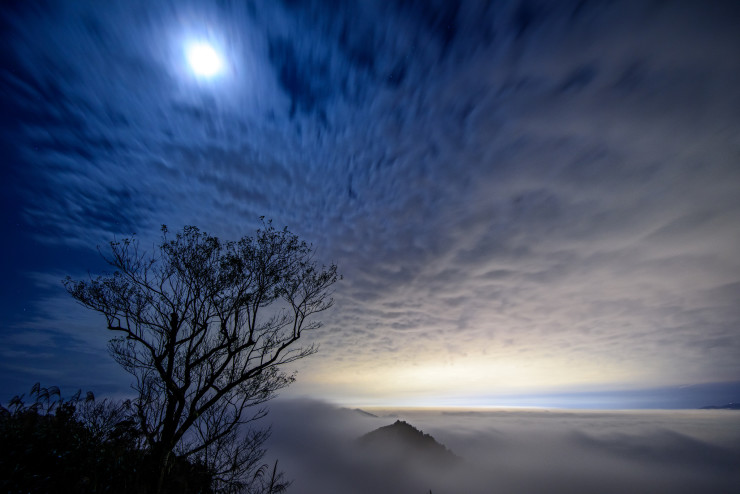Last month, we read Megan Willome’s The Joy of Poetry: How to Keep, Save and Make Your Life With Poems together as a community in our book club. We’ve continued the conversation with an invitation to be one another’s Poetry Buddy, creating a space together in the comment box to talk about a particular poem.
This week, let’s look at Moonrise a poem by D. H. Lawrence featured recently at Every Day Poems.:
Moonrise
And who has seen the moon, who has not seen
Her rise from out the chamber of the deep,
Flushed and grand and naked, as from the chamber
Of finished bridegroom, seen her rise and throw
Confession of delight upon the wave,
Littering the waves with her own superscription
Of bliss, till all her lambent beauty shakes towards us
Spread out and known at last, and we are sure
That beauty is a thing beyond the grave,
That perfect, bright experience never falls
To nothingness, and time will dim the moon
Sooner than our full consummation here
In this odd life will tarnish or pass away.
— D.H. Lawrence, from The Complete Poems of D.H. Lawrence
Now, flip to the end of The Joy of Poetry and read through Megan’s tips for How to Journal About a Poem. Over the past two weeks, we featured suggestions 1, 2 and 3 and suggestions 4 and 5 for those who don’t have the book handy. Here are the last two (but do be sure to read the rest—they’re really terrific ideas):
How to Journal About a Poem (excerpt)
6) When you read a Not for Me poem, don’t chide yourself and think, “If only I had an MFA, then I’d appreciate it.” When you don’t like a movie, surely you don’t lament the fact that you didn’t attend film school, do you? You don’t swear off movies forever. Likewise, don’t quite poetry altogether. Shrug and move on to the next one.
7) Once you get more familiar with poems, you’ll become more familiar with individual poets and may want to check out a collection of their poetry. If the collection is constructed as a unit and not a best-of compilation, the poems will comment on each other. That leads to a different type of journaling, more in-depth.
This may sound like work, but it only takes about 10-15 minutes for me to journal about a poem. Reading a poem a day will take less than a minute. If you read a poem twice, that’s two minutes. Read it with your morning coffee or before going to bed. Read it wearing pajamas or a suit or workout gear or jeans and a T-shirt. You need not apply makeup beforehand or bother to tie your shoelaces. The goal of reading a poem a day is to demystify poetry and weave it into your daily life.
— The Joy of Poetry (p. 151)
And then? Well, then meet us in the comment box. Be our Poetry Buddy and share your thoughts and ask questions about Lawrence’s “Moonrise.”
Check out our book club discussion of The Joy of Poetry
Photo by 白士 李, Creative Commons license via Flickr. Post by LW Lindquist.
___________________
Megan Willome’s The Joy of Poetry—part memoir, part poetry reflections, part anthology—takes readers on a journey to discovering poetry’s purpose, which is, delightfully, nothing. “Why poetry?” Willome asks. “You might as well ask, why chocolate?” Poetry reflects nothing more and nothing less than the pure joy of living, loving, and being, in all of its confusion and wonder. Willome’s book will gently guide you to read, write, and be a little more human through language’s mystery and joy.
—Tania Runyan, author of How to Read a Poem: Based on the Billy Collins Poem “Introduction to Poetry”
- Earth Song Poem Featured on The Slowdown!—Birds in Home Depot - February 7, 2023
- The Rapping in the Attic—Happy Holidays Fun Video! - December 21, 2022
- Video: Earth Song: A Nature Poems Experience—Enchanting! - December 6, 2022


Maureen says
It’s been a long time since I took up any Lawrence poems, and I’ve read many more of his novels than his poetry, which, I must admit, failed to be much of a draw for me. (I prefer meager doses of Lawrence poetry.)
As I recall from long-ago readings, the moon appears a lot in Lawrence’s work (symbol of?), and the twins sex and death are ever-present metaphors, a well-spring of erotic imagery.
The line I like most in this poem: “beauty is a thing beyond the grave”; it’s provocative, a bit mystical-religious.
A word that stands out is that adjective “odd” in that last line. Does Lawrence use it to mean inexplicable?
Will Willingham says
Inexplicable would make sense there. It’s hard to say ‘odd’ without some context for not-odd, and we don’t really have this life and that life to compare. Just this life. 🙂
Lawrence is not someone I read a lot of. I am always encouraged it’s not just me when I find others that don’t prefer to read someone often. 🙂
Megan Willome says
It’s kind of a meditation on the moon. I think of watching the lunar eclipse last fall from the balcony of a condo at the beach, so I saw the “confession of delight upon the wave / littering the waves.” Also think “lambent” is a good word here. Like Maureen, I liked the part about beauty beyond the grave and “That perfect, bright experience never falls / To nothingness.” There are days I need to hear that. The ending made me think of the moon’s actual phases, how they wax and wane. The moon might be dark, but that doesn’t mean it’s passed away. In that sense, we outlive it.
Will Willingham says
“perfect, bright experience never falls
To nothingness”
was my favorite line in this poem, Megan. I first read it as “perfect, bright experience never fails” which I also liked. 🙂